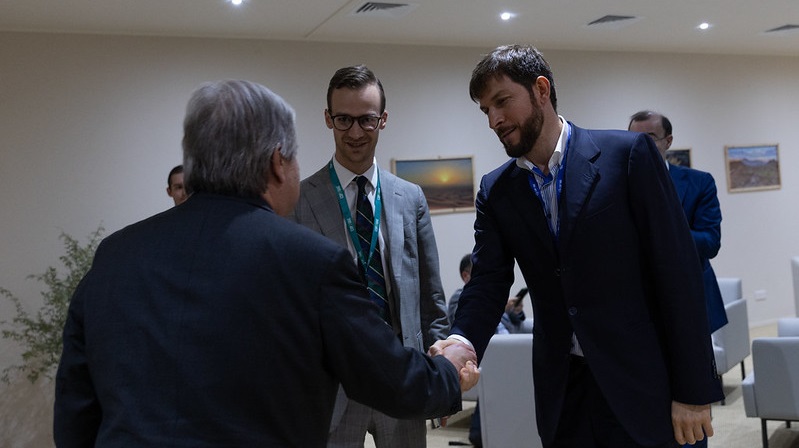The Russian government’s campaign for endorsement of “transitional fuels” succeeded at the Cop28 climate talks in Dubai.
Russia, the world’s second biggest gas producer, told the United Nations back in February that “natural gas as a transitional fuel… can be used for [emission-cutting] purposes” and this should be recognised at Cop28.
While the final Cop28 agreement does not specifically mention gas, it “recognizes that transitional fuels can play a role in facilitating the energy transition while ensuring energy security”.
It also calls on governments to transition away from fossil fuels in their energy systems so as to achieve net zero by 2050.
Diann Black-Layne from Antigua and Barbuda told the closing meeting of Cop28 that the “transitional fuel” language “is a dangerous loophole”. Coal, oil and gas are all fossil fuels and “we need to transition away from them,” she said.
But Barbados’s climate envoy Avinash Persaud later told Climate Home: “If you actually think about transitioning grids, transition fuels would help to transition with the lowest emissions. You can’t flip a switch and so in the mean time half switch. The challenge is to make sure that the slip road doesn’t become a parking lot.”
Persaud said that “more than a few” countries had supported the language “at some level and at varying degrees”. Another negotiator agreed it “wasn’t just Russia”.
Last-minute addition
Ahead of Cop28, governments and other organisations told a UN panel what they wanted to do to put the world on track to meet its climate goals, in a process known as the global stocktake.
A team of technical experts summarised all the submissions in October. The head of UN climate change, Simon Stiell, called for a “course correction”.
The technical summary included a line which called on governments to “recognise role of natural gas as an efficient transitional fuel”.
At Cop28, a leaked recording heard by Climate Home News shows a Russian negotiator said that ” we suggest emphasising the role of fuels with low-carbon footprint in particular natural gas – that’s transitional fuels and that enables efficient greenhouse gas reductions”.
The UAE Presidency put together an initial 27-page document which included the language which made it into the final text, dropping the mention of gas but referring to “transitional fuels”.
Like many other parts of this document, it included an alternative option of no text. Three days later, after talking to governments, the UAE Presidency dropped it from their next version of the Dubai deal.
With all the attention on the broader issue of fossil fuel phase-out, this language was little noticed or commented on – either in the press or by negotiators.
It stayed off the radar until the scheduled end date for Cop28, 12 December. It appeared in a draft text, according to a source who saw the text, time-stamped 8pm that night.
But some negotiators didn’t see it until the text was published at 7am the following morning. Four hours later, the closing plenary meeting began and within minutes it had been approved.
‘An honest paragraph’
The strongest supporters of anti-fossil fuel language at Cop28 were developed nations, particularly the European Union, and small islands.
But on gas, developed countries did not want to resist, and small islands were still in a separate meeting room discussing the text when the decision was made.
Speaking to press shortly afterwards, German foreign minister Annalena Baerbock said the EU delegation had not had much time to discuss the text.
But, she said through a translator, “for me it is really an honest paragraph”. She said Germany and the EU have been accused of hypocrisy at previous Cops for continuing to use gas while asking other countries to move to renewables.
“We wanted to show that this does not happen from one day for another but it will happen slowly, slowly, slowly,” she said. Gas is “a bridge”, she said, and “every bridge has an end”.
Kaveh Guilanpour, from the Center for Climate and Clean Energy Solutions, said he’d rather the language had not been there “but in many ways its consistent with what lot of countries and regions are actually doing”.
The day before Cop28 closed, Brazil auctioned 193 oil and gas blocks. On the day it closed, the Italian export credit agency lent €400m ($436m) to a firm to supply Italy with gas. The day after, the board of a European public bank decided to keep lending to gas pipelines and power plants.
Small islands not there
The negotiating group for 39 small, developing island states (Aosis) was most likely to object to that language.
But, having seen the final text at 7am, when the plenary started they were still frantically discussing whether to support it or not.
As they entered the room with their comments on the text in hand, the room was already standing to applaud Cop28 president Sultan Al-Jaber’s announcement that it had been adopted.
Their lead negotiator Anne Rasmussen from Samoa took the microphone to say she “was a little confused about what happened”.
Delivering her prepared remarks, she said that because of the transitional fuels language – and other issues – that the “course correction has not been secured”.
“We have made incremental advancements over business as usual when what we really needed is an exponential step change,” she said.
To a standing ovation, she said the text includes a “litany of loopholes” for carbon capture and on the removal of fossil fuel subsidies.
This article was updated on 16/12/23 to include the leaked recording of the Russian negotiator
